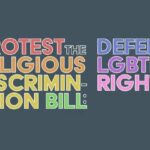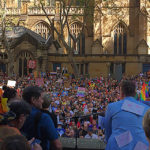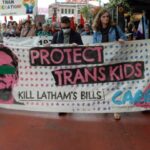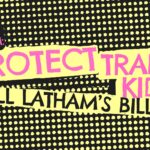New South Wales Parliament Passes Greatly Diluted LGBTIQA+ Equality Laws
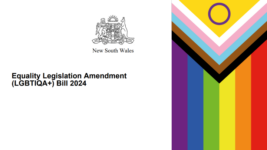
Transgender people in NSW will no longer have to “undergo surgery before they can change their sex on their birth certificate” as of 1 July next year. And this long-sought reform brings this state’s laws into line with other Australian jurisdictions, which is reason to celebrate, as some transgender people are unable to undertake gender affirmation surgery, while others simply don’t want to.
Tabled by Independent member for Sydney Alex Greenwich on 24 August last year, the Equality Legislation Amendment (LGBTIQA+) Bill 2023 (the Equality Bill) was an omnibus bill seeking to facilitate a range of reforms that relate to the queer community, via the amendment of discriminatory laws and the addition of missing protections.
The Equality Bill had widespread support in the community, but where it experienced opposition was in parliament. The Coalition opposition took issue with it and voted against its passage this week, while NSW Labor dragged its feet on the legislation for so long that when it finally did get up the 62-page amendment filled first draft had been dramatically slimmed down to its 24-page final draft.
Pride in Protest warned Sydney Criminal Lawyers in August 2024 that it feared the final outcome of the legislative process was that the various amendments would be itemised, so that some of the reforms, such as the right to change a sex marker without surgery, would be enacted, whilst other more controversial measures would be the subject of further debate, reviews and delays.
And as numerous reforms were cut from the final draft, the Equality Bill that had sought to amend twenty pieces of legislation, when passed on Thursday evening, only had implications for nine Acts of NSW parliament.
Equality lite
“I am pleased to report to the house that the government will support the Equality Bill introduced by the member for Sydney,” said NSW premier Chris Minns in the lower house on Wednesday. “I completely acknowledge that the bill is not everything that the member for Sydney has asked for.”
“The bill contains provisions that we regard as commonsense changes,” he added.
As the second reading debate commenced, Liberal MP Alister Henskens explained that the heavily amended version of the bill, the result of negotiations between NSW Labor and Greenwich, had only been posted to the parliamentary website at 12:15 pm that day, which was the first time it had been available to the opposition.
Greens member for Newtown Jenny Leong outlined that her party was “excited to see this reform will ensure that trans and gender diverse adults will have the ability to change their sex on their state documents without undergoing surgery”. However, she added that she had “a deep sense of disappointment and sadness” as the legislation was going “to be gutted”.
The amended bill then passed in the lower house on Wednesday, with 50 members voting in favour, with 30 against, while the legislation made it through the Legislative Council the following day, with 17 for and 13 against.
Equality granted
Climate change minister Penny Sharpe detailed the amendments that were passed in full during her second reading speech on the bill in the upper house on Thursday, explaining that the first amendment was the right to self-identification in respect to a change of sex on birth certificates.
The bill replaced part 5A of the Births, Deaths and Marriages Registration Act 1995 (Cth), so that a transgender or gender diverse person over 18 can change the sex descriptor on their birth certificate without gender affirmation surgery, but rather with an accompanying statement from an adult who has known them for at least 12 months, while parents can change sex on behalf of children under 18.
However, unlike the original version of the legislation, the new law places restrictions on who can self-identify when changing the sex on their primary identification and these individuals include inmates, remandees, parolees, periodic detainees, people subject to a supervision order, forensic patients, correctional patients, along with people in custody or under supervision.
The bill further adds to the definition of intimidation contained in the Crimes (Domestic and Personal Violence) Act 2007 (NSW), so that it will soon apply to “outing” a person, or intentionally disclosing an individuals’ sexual orientation, gender, a variation of sexual characteristics, that they are living with HIV or that they are, or have been, a sex worker.
Once this amendment has taken effect mid-next year, the offence of stalk/intimidate, contrary to section 13 of the Crimes (Domestic and Personal Violence) Act will apply to outing and can then lead to up to 5 years imprisonment.
Section 15 of the Summary Offences Act is to be revoked, so it will no longer be a crime to live on the earnings of sex work, with Sharpe outlining that as sex work is legal, the offence makes little sense. However, section 15A, which contains the offence of causing or inducing sex work, will be retained with 12 months prison time applying, to guard against pimping and exploitation.
The bill also lifts the ban on overseas commercial surrogacy when it is in the child’s best interests to go ahead with adoption. It removes derogatory references to HIV in NSW drug misuse laws and the legislation governing workers compensation. And gender identity and variations of sex characteristics have been added as a consideration to child protection laws.
The Equality Bill further clarifies that prejudicial behaviour against trans, gender diverse and intersex persons is an aggravating factor in sentencing in regard to crimes, while mental health laws will no longer consider expressions or refusals around gender identity to be categorised as mental disorders.
Equality gutted
In terms of what was promised but will not be forthcoming in regard to equality laws in respect of LGBTIQA+ people, broad changes to the Anti-Discrimination Act 1977 (NSW) were dropped, which would have provided protections for bisexual and asexual people, along with laws protecting variations on sex characteristics, or intersex people, and sex workers.
Another key amendment that both major parties have been resisting, and in this state are continuing not to progress, is the revoking of laws that allow private education institutions, including religious schools, to discriminate against teachers and students on the grounds of their sexual orientation and gender identity.
Another amendment to the offence of publicly threatening or inciting violence on the grounds of race, religion, sexual orientation, gender identity or intersex or HIV/AIDS status, contrary to section 93Z of the Crimes Act 1900 (NSW), so that it would include sex workers as well, was also dropped.
NSW attorney general Michael Daley advised that the proposed changes to the Anti-Discrimination Act and the Crimes Act were now being considered by the NSW Law Reform Commission.
The Children’s Guardian Act 2019 (NSW) has not been altered so that variations on sexual characteristics are to be a consideration in decision-making. Changes to government sector employment laws to recognise sexual orientation and sex characteristic variations and government sector employment rules to include transgender and intersex people were further dropped.
Alterations to the Court Security Act 2005 (NSW), the Crimes (Forensic Procedures) Act 2000 (NSW) and the Crimes (Administration of Sentences) Act 1999 (NSW) to recognise transgender and intersex people were neither progressed.
And changes to interpretation laws to include gender, and the inclusion of provisions relating to transgender and intersex people in the Law Enforcement (Powers and Responsibilities) Act 2002 (NSW), as well as the Sheriff Act 2005 (NSW), were all dropped from the final draft of the Equality Bill as well.
Keeping them begging
Pride in Protest held a demonstration out the front of NSW parliament on Friday 11 October, as the group decried the fact that “NSW Labor has repeatedly delayed passing the” Equality Bill, and that the queer community can’t “wait any longer” while its rights “are treated as a political football by bigoted politicians”.
“We know now that Chris Minns’ Labor Party intends to keep us begging,” said Pride in Protests’ Quay-Quay Quade over a loudspeaker before parliament last week. “We know that concessions have been made. There is a pathway to self-ID in sight. Minns knows something has got to give. He fears the debate being out in public, where he can’t control it.”
“He fears a mass movement,” she added. “He has a hard enough time controlling his party for fuck sake.”
Greens MP Jenny Leong explained in a press release on Friday that while she welcomed the reforms that were progressed, especially the provision for self-identification, she lamented that 35 pages had been slashed in the final draft of the Equality Bill, and she stressed that it was particularly disappointing that the changes to antidiscrimination laws were dropped.
“This move once again delays basic legal protections for LGBTIQA+ people that should already be law. It is designed to pander to shock jocks and the religious right,” Leong made clear.
“That’s not good enough.”


